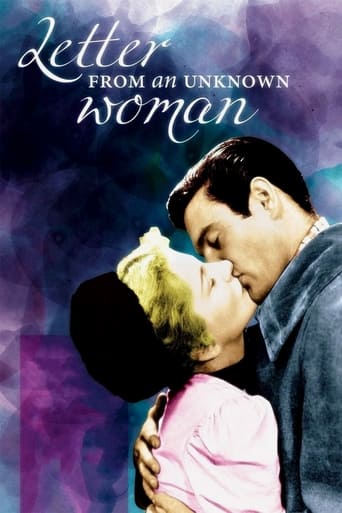jc-osms
Preposterously plotted but stylishly directed and impeccably acted, this is vintage Golden Age Hollywood melodrama. So much of the story-line is improbable, as the young Joan Fontaine's poor young French teenager develops a lifetime crush on the debonair but rakish concert pianist Louis Jourdain, a fascination that has tragic consequences for both. Like another classic film from around the same time "Portrait Of Jennie" the mistake is made in initially having the female lead attempt to carry herself off as a much younger version of herself, but once she matures into adult-hood, Fontaine is effective as the quietly enigmatic woman forever drawn to Jourdain's debonair charms.I found it equally hard to believe that Jourdain's character could forget his previous encounters with Fontaine, especially the way that Max Ophuls directs the telling scenes, never mind that she eventually goes on to father his child. Such a plot could only end in death and tragedy and while I couldn't believe a word of it, still it was wonderfully entertaining along the way.The costumes and sets are excellent and Jourdain and Fontaine are to be commended too for their fine performances, but doyens of film-making will particularly enjoy the skill with which director Ophuls employs his camera-work, so fluidly at times that the action appears to float in front of the viewer's eyes.In a way, this film reminded me of grand opera, a wholly unbelievable story brought to life by the skill of its creator.
mtggibbons
Letter from and Unknown Woman is a film that I would strongly recommend watching twice, and with as open a mind as possible. As a modern woman— with some admittedly strong feminist sensibilities—I was infuriated by Lisa's character the first time I watched this movie. While indubitably romantic and admirable in her persistence as a girl and young woman, Lisa seemed pathetic by the end of the film when she leaves a loving husband and child for a man who has never loved, valued or respected her enough to even remember having met her in the past. Similarly, I could not find a way to empathize or relate to Stephan's character. I feel like Ophüls ignored him in order to more deeply delve into Lisa's psyche, an understandable choice, but one that resulted in a rather flat male lead. At the end of the film, Stephan reads Lisa's letter and is so guilt-ridden over his treatment of her that he chooses to face her husband rather than run away from their duel as he had intended. This is a pivotal moment in the plot, but I found it impossible to believe that someone who had been so consistently self-serving and careless his entire life could have such a drastic change of character. Further-more, because Stephan is so undeveloped, the viewer can't fully sympathize with Lisa's infatuation with him, and she accordingly appears more like a lovelorn teenager than a passionate, committed woman. Her sacrifices for Stephan would be, if not justified, at least understandable if he had been a more admirable man.Despite my reservations with regard to the plot, the reason I recommend a second viewing is the brilliance and artistry of Ophüls' direction and thematic choices. Throughout the film he uses similar camera angles, language and actions to create a repetitive, illusory sensation that mimics Lisa's delusions about her relationship with Stephan. When the two are riding the "train" in the Prater and visiting various "countries," a scene that is already a clear metaphor of Lisa's self deception, Stephan tells the park operators to start over after they have gone through all of the countries with the line "we will revisit the scenes of our youth." Another instance of this sort of repetition is the two train station scenes in which Lisa says goodbye to Stephan, and later to their son. In both instances, the characters claim that they will be together again in two weeks, a cruel irony as Lisa loses both of them. Lastly, the film is a frame story that begins and ends with Stephan reading Lisa's letter in his apartment. As the credits roll, the viewer is left with the impression that the story has come full circle, back to where it began, just as Lisa spent her lift in a cycle of pining after Stephan and never winning him. Letter from and Unknown Woman is a beautiful piece of art, despite some of its failings as a realistic portrayal of romance and human relationships.
Alex Bennis
In my opinion this is a tragic love story suited for the time period it was created in. The story follows the main character Lisa Berndle as it looks by on her life and events involving the love of her life Stephen Brand. As a young girl in Vienna, Austria Lisa lives in an apartment complex as the leading male role Stephen Brand moves in. I liked how in the beginning Lisa is unaware of Stephen's appearance and age as she is mesmerized by his piano playing outside his window. This adds a deeper level of connection between Lisa and Stephen instead of the traditional love at first sight theme for most romances in this time period. Of course, not much later in the film Lisa meets Stephen face to face and is taken back by his debonair style. After this meeting Lisa is almost obsessive in her quest to get closer to Stephen. She goes as far as sneaking into his apartment while he is out, and spying on him as he comes home, with a new woman every night. Somehow Lisa sees past his womanizing deeds, because she has truly fallen in love with him. This part is very bothersome, because she is so blinded by his musical talent, charming personality, and handsome appearance that she can't see he will never feel the same way about her. As the story progresses, Lisa's family moves away forcing her to part with Stephan. Now Lisa has the chance to move on and find someone new that could reciprocate feeling on love and respect. However, when a Lieutenant of the military proposes to her she turns him down because she can't get rid of her feelings for Stephan. In fact, she decides that it's best if she part from her family and move back to Vienna to maybe by chance win Stephan's heart. For a brief moment Lisa had the chance to live a life with a man who actually care for her, but instead her obsessive childhood crush got in the way of her opportunity to have a somewhat happy ending. This notion of people falling for the wrong person happens in present day as it did back then. Even when a person sees a person's misdeeds they view the situation with rose colored glasses, and allow their perception of reality to be warped. These situations are typically followed by a series of events that don't bode well for those who chose not to accept the truth. As we see with Lisa she comes back to Vienna, and for a lack of better word stalks him until he notices her. They go on a date and Stephen takes her through the usual routine, like he does with all his groupies. This only further deepens Lisa's view of Stephen, as a charming gentleman, who has finally returned her feelings of love. Unfortunately, this is not the case Stephan appears to be after one thing only, and that is sex. After the date he takes her home for the night, and the scene is brilliantly shot from the same angle, where Lisa saw many of other ladies come before her. It's made apparent that they had relations that night, and then shortly after he must leave to play concerts in other cities. In present day terms this is a "hit it and quit it" type move Stephan performs to continue his conquest of woman. Tragically, Lisa gets pregnant with Stephen's child, but never sees him again, and remarries. She was most likely forced to, because at that time a single mother didn't have the best chance of supporting herself. She ends up seeing Stephan later, where he claims to recognize her, but does not know her name. She later goes to meet up with Stephan to tell him about their son, but once he starts his same womanizing routine she finally notices that everything has been a lie. It was interesting to see Lisa finally come to this realization, but only after all the woman she saw him with and getting pregnant. The whole situation doesn't seem realistic, but unfortunately even today it's sad how many people fall victim to these same circumstances.
Dom Gulli
Letter from an Unknown Woman has the classic recipe for a romantic drama – the early stages of infatuation, the eventual realization of mutual feelings, and finally, heartbreak. However, the film uses this typical template in an over-the-top fashion to the point of making the film a dramatic clichéd romance flick.The level of Lisa's infatuation with Stefan at her early age is the understandable puppy love, school girl crush – which gives it the effect of being obsessive. Perhaps this is simply the difference between American and Viennese culture. However, her abandonment of her family at the train station simply to stay in Vienna, where Stefan resides, is pretty ridiculous. This was the point of the movie where I began to become restless, with the rest of the film becoming predictable – Lisa and Stefan finally get together, Stefan is a typical man whore and has a one night fling with Lisa, and promptly forgets about her. This plot is borrowed in modern movies left and right, and personally, while this film was created long before today's modern films, it's a cornerstone (and I use this term sardonically) that writers can't seem to shake.The "twist" so to speak, when Lisa and Stefan cross paths at the opera, provides for a break in the stagnancy and predictability in the plot. Lisa, who is married, decides to go home with Stefan, despite that she fears he forgets who she is. This is indeed the case; Stefan uses the same "lines" on Lisa during their tryst as he did during their first encounter. Lisa recognizes this and slips out of his apartment, leaving Stefan confused as to why what seemed to be a sure thing had disappeared in front of him. The cliffhanger ending was somewhat flat, because either outcome wasn't very interesting – either Stefan lived, or he allowed himself to be killed in what was presumably a duel with Lisa's husband. Once again, the film provides a cliché and not a very stimulating one at that.Overall, I found the clichés tiresome and the film, for me, dragged on. Perhaps it is that I have seen modern films that have similar romantic plots, complete with the "unexpected twist" at the end. However, because the film was released in 1948, it was something fresh – at least on the silver screen.If it was unclear, I personally did not enjoy this film, but I can appreciate the culture of Vienna at the time that is portrayed throughout. References to the opera, and especially the music of the time, were some of the components that shined through what I thought to be otherwise a very dull 87 minutes.




